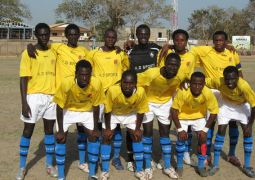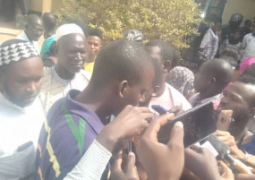The Association of Non-Governmental Organizations (TANGO) over the weekend convened a consultative meeting to discuss the least developed countries (LDC) Istanbul action plan.
In his welcome remarks, Ousman Yabo, executive director of TANGO, hailed the civil society and government representatives for attending the meeting.
“This very important consultative meeting is geared towards exchanging ideas among stakeholders in addressing the issues affecting the LDCs and to discuss the Istanbul action plan,” he said.
The representation of the government is clear indication of the cooperation between the civil society and the government, he said, while addressing the issues of LDCs and calling for collective efforts from both the government and the civil society.
He therefore called on all stakeholders to participate fully in addressing the issues of LDCs, since Africa has the highest number of LDCs.
In his introductory remarks, Least Developed Countries Watch focal point, Amadou Taal, said he was delighted at the turnout of stakeholders at the consultative meeting.
He stressed the important role members of the civil society are playing in the country, describing them as “vibrant and focused”.
The civil society is geared towards complementing government’s effort at national development, Mr Taal said, adding that Worldview is the focal point of the least developed countries and as civil society, it is important to have consultative forums to strengthen the role of the civil society in the developmental framework.
Mr Taal asserts that civil societies are very much concerned with setting up strategies in improving their activity to ensure the level of poverty in the country is reduced as The Gambia is considered to be among the least developed countries in Africa.
There are more LDCs in Africa than any other continent in the world, Mr Taal asserts, saying: “This means that the level of poverty in Africa is much more compared to other continents in the world.”
LDC Watch is part and parcel of the Istanbul Plan of Action, he said, adding that it is the wish and aspiration of the civil society to reflect on the Action Plan.
Speaking at the opening forum, LDC Watch President Demba Dembelleh thanked the stakeholders for their participation in the consultative meeting on LDCs Istanbul Action Plan.
He also briefed stakeholders about LDC Watch, saying it is an international network of civil society organizations representing the voices of the least developed countries.
He added that the consultative meeting was held to ensure civil society and governments put hands together to see how best to alleviate poverty in Africa.
Excerpts from Istanbul Action Plan
Below are excerpts from the Programme of Action for the Least Developed Countries for the decade 2011-2020, which was set to be adopted at the LDC-IV.
The overarching goal of the Programme of Action for the decade 2011 – 2020 is to overcome the structural challenges faced by the least developed countries in order to eradicate poverty, achieve internationally agreed development goals and enable graduation from the least developed country category.
Guided by the overarching goal, national policies of least developed countries and international support measures during the decade will focus on the following specific objectives with the aim of enabling half the number of least developed countries to meet the criteria for graduation by 2020:
Achieve sustained, equitable and inclusive economic growth in least developed countries, to at least at the level of 7 per cent per annum, by strengthening their productive capacity in all sectors through structural transformation and overcoming their marginalization through their effective integration into the global economy, including through regional integration;
Build human capacities by fostering sustained, equitable and inclusive human and social development, gender equality and the empowerment of women; reduce the vulnerability of least developed countries to economic, natural and environmental shocks and disasters, as well as climate change, and enhance their ability to meet these and other challenges through strengthening their resilience;
Ensure enhanced financial resources and their effective use for least developed countries’ development, including through domestic resource mobilization, official development assistance (ODA), external debt relief, foreign direct investment and remittances;
Enhance good governance at all levels, by strengthening democratic processes, institutions and the rule of law; increasing efficiency, coherence, transparency and participation; protecting and promoting human rights; and reducing corruption and strengthening least developed country governments’ capacity to play an effective role in their economic and social development.
Read Other Articles In Article (Archive)
Gunjur assistant imam urges Muslims to support the poor, relatives
Aug 21, 2012, 11:34 AM




